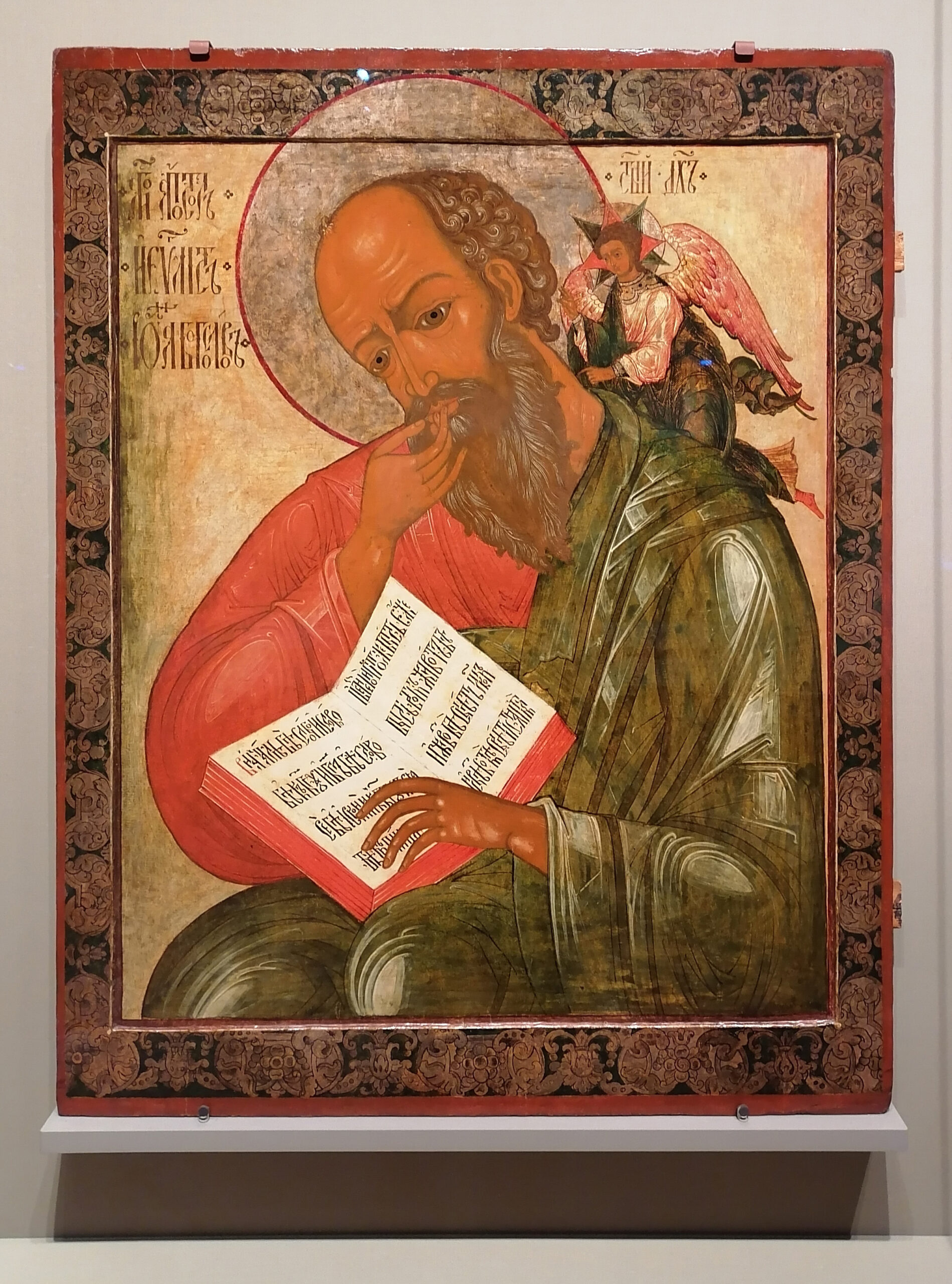While the sinful woman was offering the myrrh, the disciple was making terms with the lawless; she rejoiced in emptying out that, which was precious; he hastened to sell Him, Who was above all price. She acknowledged the Master, he severed himself from the Master; she was set free, and Judas became a slave to the enemy. Monstrous was his callousness! Great was her repentance! Grant me this also, O Savior, Who suffered for us, and save us.
~Praises, Bridegroom Service, Holy Tuesday Evening, Trans. by Fr. George Papadeas
—
One of the Pharisees asked Him to eat with him and He went into the Pharisee’s house, and took His place at table. And behold, a woman of the city, who was a sinner, when she learned that He was at table in the Pharisee’s house, brought an alabaster flask of ointment, and standing behind Him at His feet, weeping, she began to wet His feet with her tears, and wiped them with the hair of her head, and kissed His feet, and anointed them with the ointment. Now when the Pharisee who had invited Him saw it, he said to himself, “If this Man were a prophet, He would have known who and what sort of woman this is who is touching Him, for she is a sinner.” And Jesus answering said to him, “Simon, I have something to say to you.” And he answered, “What is it, Teacher?” “A certain creditor had two debtors; one owed five hundred denarii, and the other fifty. When they could not pay, he forgave them both. Now which of them will love him more?” Simon answered, “The one, I suppose, to whom he forgave more.” And He said to him, “You have judged rightly.” Then turning toward the woman He said to Simon, ”Do you see this woman? I entered your house, you gave me no water for My feet, but she has wet My feet with her tears and wiped them with her hair. You gave Me no kiss, but from the time I came in she has not ceased to kiss My feet. You did not anoint My head with oil, but she has anointed My feet with ointment. Therefore, I tell you, her sins, which are many, are forgiven, for she loved much; but he who is forgiven little, loves little.” And He said to her, “Your sins are forgiven.” Then those who were at table with Him began to say among themselves, “Who is this, who even forgives sins?” And He said to the woman, “Your faith has saved you; go in peace.”
Luke 7:36-50
While the Hymn of Kassiane seems to grab all the headlines for the Bridegroom Service of Holy Tuesday evening, the hymn we are discussing in this reflection actually more completely captures the theme of the day, which is repentance, and the contrast between a disciple and a sinful woman.
The most obvious lesson of this hymn is that the disciple, Judas, a member of the inner circle, betrayed Christ. This event, the exchange of thirty of pieces of silver with the Pharisees for delivering Christ into their hands, occurred in the Holy Week narrative on Holy Wednesday, two days before the Passover. (As we have discussed, the evening services of Holy Week are really Orthros/Matins, or morning services, done twelve hours early, so on Tuesday evening, we are offering the Orthros of Wednesday morning, so the narrative is correct in speaking about the betrayal of Judas on Tuesday evening). A lot of (in my opinion, too much) attention will be given to Judas during Holy Week. He, and his actions, will be condemned again and again. We will discuss him more later. For this reflection, and on Holy Tuesday night, we acknowledge simply that Judas, who as a disciple would have seemed to be an unlikely candidate to betray the Lord, did just that. He who started out so close to the Master, ended up far removed from Him.
Judas is contrasted with a “sinful woman.” There are two occasions in the Gospel when Jesus has his feet anointed and wiped with the hair of a woman. One occasion is by Mary, the sister of Martha and Lazarus, who “anointed the feet of Jesus and wiped His feet with her hair.” (John 12:3) She did this right before Palm Sunday. Judas was present for this, and criticized Mary for doing this, saying that the ointment could have been sold and the money given to the poor.
In Luke 7, we read the account of a sinful woman who anointed the feet of Jesus with her tears and wiped them with her head, and then anointed them with ointment. The woman is unnamed, and we don’t know exactly when in Jesus’ ministry this happened. The Pharisees criticized this action of Jesus in allowing this, saying that if He knew what sort of woman was doing this, He would not have allowed her to touch Him. Jesus then tells the story above, which ends with Jesus forgiving the sins of the woman, telling her that she is now saved because of her faith and that she should depart in peace. Here is a woman filled with sin, scorned by her society, receiving redemption because of her humility and the grace of Christ. She would have seemed to be an unlikely candidate to be honored by the Lord, and yet He did just that. She who started out far from Christ, ended up close to Him.
Humility and repentance are lessons we will encounter almost daily. When we achieve some status, it will be easy to not be humble about it. And in our self-exaltation, this is where we will be humbled. There will also be occasions when we are shut out and scorned. It will be tempting to exalt ourselves, especially by tearing down others. When we take the path of humility, this is when we are exalted. (see Luke 18: 19-14, the parable of the Publican and the Pharisee) There will be times when we feel like the sinful woman, like we are estranged not only from God but from everyone else as well. This is when we need to move forward with repentance, with the humility that acknowledges past wrong-doing, and with repentance that seeks to right the wrongs of the past. This woman had no reason to think she was redeemable, and yet she was redeemed. She approached Christ in the most humble way possible. She did not ask for anything, she did not expect anything. She recognized Him as Lord, and humbly washed His feet. In contrast, the Pharisees, those who had studied the Scriptures and should have recognized the Messiah in their presence, these were the ones who showed the most scorn for Jesus. It was the sinful woman who received redemption from the hand of Jesus.
We know that a harlot was a prostitute, and that prostitute’s sin by selling their bodies for money. While we may not be prostitutes, we do sell ourselves out when we engage in gossip or judgment or other kinds of sin. In some sense, we are all sinful like the harlot, we just commit different sins than she did. In the same manner, our redemption comes about through tears of repentance. We are cleansed of sin at baptism, through the water of the baptismal font. We can return to the state we were in at our baptism, with a fully cleansed soul, when we approach with tears of repentance. This is formalized at the sacrament of confession, when we approach Christ with tears of repentance and receive absolution through His grace. And we can also come closer to Christ any time through our own personal repentance, which comes when we simply stop walking in the ways of sin and start walking in the ways a God, a decision that can be made at any moment under any circumstance.
It’s not how we start that matters, but how we finish our life that matters. We are shown in the Holy Week journey that one can walk with Christ for a long time (Judas) and not cross the finish line with Him. And in contrast, one can be estranged from Christ for a long time (the sinful woman, the thief on the cross) and be redeemed by Him. There is no one who doesn’t have the potential to fall away. There is no one who does not have the potential to be rescued, redeemed, restored, and rewarded. There is hope for everyone!
Today Christ comes to the house of the Pharisee, and a sinful woman approached Him falling at His feet and crying out: “Behold me, engulfed in sin, and in despair for my deeds; and yet, not despised by Your goodness. Grant me, O Lord, the remission from evil, and save me.” (Aposticha, Bridegroom Service, Holy Tuesday Evening, Trans. by Fr. George Papadeas)
It’s not how we start but how we finish that is important. Every saint has a past. Every sinner can have a future.

